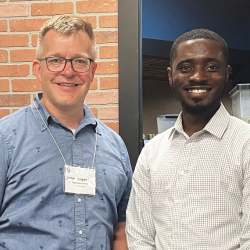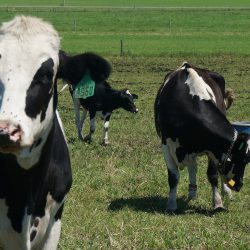When most people think about research skillsets, understanding science policy is rarely the first thing that comes to mind.
Science policy refers to how the government allocates money and other resources to various science and research agencies. For a researcher, it may not seem as important as honing skills of scientific inquiry. However, understanding science policy is extremely valuable to scientists of all stripes when deciding what to investigate, advocating for their work, or even just sharing it with the world.
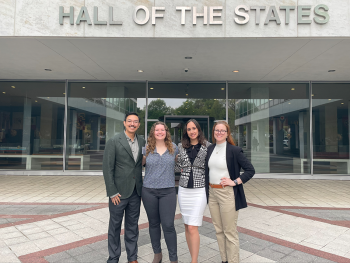
Getting a chance to explore policy in connection with research is, therefore, very useful. The Catalyzing Advocacy in Science and Engineering (CASE) workshop is an opportunity for students from STEM fields across the country to dip their pipettes into the world of science policy. It’s organized by the American Association for the Advancement of Science (AAAS) and in 2024, it was held in Washington DC from April 14-17.
Ursula Abou-Rjeileh, a Comparative Medicine and Integrative Biology PhD student studying fatty acid supplementation in dairy cows here at the College of Veterinary Medicine, was one of four MSU students to be sponsored by MSU to attend the workshop. She was offered the opportunity through her participation in MSU’s Broadening Experiences in Scientific Training (BEST) program.
“I wasn’t necessarily interested in the government or working in the government, but I wanted to learn what’s out there. I think it’s also important to know what happens behind the scenes—what the process is for the budget and funding that comes to researchers,” says Abou-Rjeileh.
CASE at a Glance
The workshop takes place over several days, each with a slightly different focus, but all preparing participants for the final day: the Hill visit. On this culminating day, the workshop group spends time at the Capitol, visiting representatives and staffers to advocate for their own research.
The first day focused on introductory panels on science policy. Day two had participants get into groups and simulate federal budget allocation by taking on the roles of policymakers. The third day included speakers from federal research agencies and hands-on workshops to train participants how to speak to government representatives and present their research effectively.
Then the big day: applying their newfound skills on the Hill.
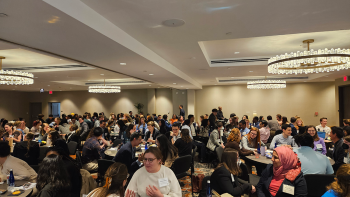
“We completed different exercises to research the different people we were going to meet with, topics to discuss, and how to take advantage of every minute we were there,” says Abou-Rjeileh. “It could be a five-minute meeting, or it could be a thirty-minute meeting. We even met one staffer in the hallway because their representative's office was too busy!”
Packing so much learning about science advocacy into three days before applying those skills is no easy feat, but Abou-Rjeileh was there to get as much as she could from the experience. “It was very interactive. We were able to ask questions, and the panelists had lots of stories to tell.”
Researcher Role Models
A highlight of CASE for Abou-Rjeileh was the variety of panelists. The workshop allowed participants to build a network not just with other students, but with those who presented to the group.
“Seeing these people get on stage and speak to us about their experience—they may be big names, but you realize they are human. They each had their own diverse backgrounds and struggles,” says Abou-Rjeileh. “Seeing other women very high up in federal agencies, some with families and children, was also very encouraging for me as a woman in research. I found it relieving. If they could get to where they are, I can too.”
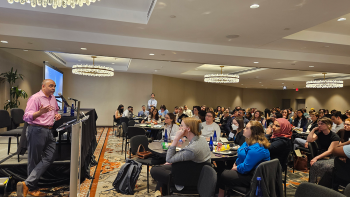
Communicating at CASE
Abou-Rjeileh stated that one of the big challenges for everyone preparing for the Hill visit was learning how to discuss research in laypeople’s terms.
“As researchers, we’re so used to presenting our work at conferences, to other people in our field, or writing research papers. Communicating our research in a way that’s understandable to the average person is hard for many of us,” she states.
The main guidelines provided at the workshop to tackle this challenge were: prioritize what you want to say and say it first; avoid jargon and speak the language of your audience; show results; make it memorable by framing your work as a story; highlight the results or outcomes of the research; and be concise.
“Learning this skill takes practice—if you are familiar with an elevator pitch, it’s quite similar, except you have to be prepared to go into a lot of detail if your conversation partner has questions. It could be very brief or thirty minutes, and you will not know until you start talking,” says Abou-Rjeileh.
Putting the Politics into Policy
Another aspect of the workshop that proved discomfiting was the extent politics were involved. For many scientists, it is tempting to ignore the politics behind funding and focus only on research and outcomes. However, taking politics into account was an important part of speaking to government representatives.
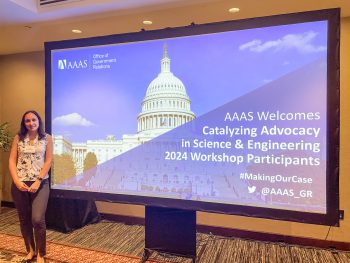
“I am not a politics person,” says Abou-Rjeileh. “It’s not something I usually engage with. But it’s important to realize that you might be at a table with people whom you get along well with on a personal level, however, they may bring up political opinions that you disagree with, and you have to be prepared to respect that person’s opinion while still voicing your own.”
“We were able to see what they vote for and what they’re against. Not everyone we met with was someone whose actions I would fully agree with. But I had to set that aside and convey the message of my research. It’s important to show that the work we are doing is not wasting money that is allocated to us—we are getting results that will hopefully lead to a positive impact in the future.”
To continue her and her colleagues’ research, Abou-Rjeileh must communicate its value to everyone she possibly can so that funding continues to support her hard work.
To the Hill and Beyond
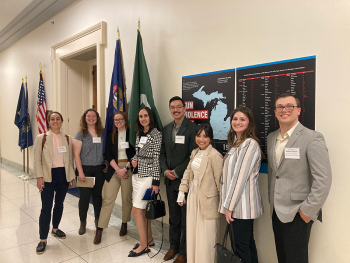
When the Hill visit finally arrived, Abou-Rjeileh and other students from Michigan managed to meet with the staff of six representatives, including Senator Gary Peters, Senator Debbie Stabenow, Representative Debbie Dingell, Representative John Moolenaar, Representative Elissa Slotkin, and Representative Haley Stevens.
Though she entered the workshop without interest in working in a government position, Abou-Rjeileh says she gained a lot from the comprehensive look at science advocacy and a great practical application of the skills she learned.
“I think whatever position or job I end up at—if it involves research (and it should involve research!), I should be advocating for the research that I’m doing and talking about it to the public,” says Abou-Rjeileh, “It's very important for those of us who are doing the science to keep informing the general public so they’re more aware of what’s going on, of what's out there, and that we’re not just taking taxpayer money. We’re doing things to help them, their animals, or the environment. We’re all in this together.”

